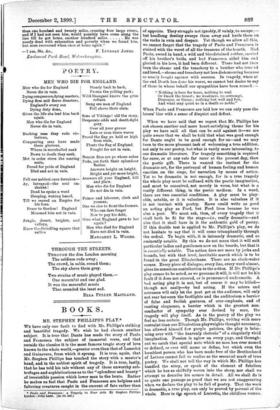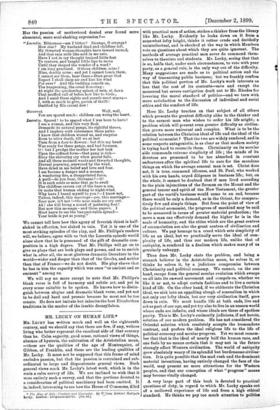BOOKS.
MR. STEPHEN PHILLIPS'S PLAY.* WE have only one fault to find with Mr. Phillips's striking and beautiful tragedy. We wish he had chosen another subject. It is true that Dante has made the story of Paolo and Francesca the subject of immortal verse, and that outside the classics it is the most famous tragic story of love known to the whole world,—greater even than that of Lancelot and Guinevere, from which it sprang. It is true, again, that Mr. Stephen Phillips has touched the story with a master's hand, and in the noblest spirit of tragedy. It is true, lastly, that he has told his tale without any of those unworthy sub- terfuges and sophisticationa as to the "splendour and beauty" of irresistible passion which lower man to the brute. Rather he makes us feel that Paolo and Francesca are helpless and faltering creatures caught in the current of fate rather than
• Paolo and Francesca: a Tragedy in Four Acts. By Stephen Phillips. London : John Lane. [4a. 6d. net.]
of appetite. They struggle not ignobly, if vainly, to escape ;— but headlong destiny sweeps them away and hurls them on the rocks in ruin and despair. Yet though we allow all this, we cannot forget that the tragedy of Paolo and Francesea is stained with the worst of all the treasons of the hearth. Had
Paolo, sword in hand, a wild and bloodstained robber, carried off his brother's bride, and had Francesea aided him and gloried in his love, it had been different. There had not then been the shame and the treachery to a brother who trus'ed
and loved,—shame and treachery not less dishonouring because so nearly fought against with success. In tragedy, when at the end Death has done his worst, we cannot but desire to say of those in whose behalf our sympathies have been roused : — "Nothing is here for tears, nothing to wail Or knock the breast ; no weakness, no contempt, Dispraise, or blame ; nothing but well and fair, And what may quiet us in a death so noble."
When Paolo and Francesca are laid low we can only pass the lovers' bier with a sense of disquiet and defeat.
When we have said that we regret that Mr. Phillips has not chosen another and more heart-satisfying theme for his play we have said all that can be said against it—we are quite aware that we shall be told that what was good enough for Dante ought to be good enough for us—and we may turn to the more pleasant task of welcoming a true addition, not only to our poetry, but what is vastly more interesting, to
our dramatic literature. For tragedy something is required far rarer, or at any rate far rarer at the present day, than the poetic gift. There is wanted the instinct for the dramatic art, for the portrayal of human feeling and human
emotion on the stage, for narration by means of action. Yet to be dramatic is not enough, for in a true tragedy
the whole play must be suffused with the poetic imagination, and must be conceived, not merely in verse, but what is a vastly different thing, in the poetic medium. In a word, there are two essential conditions. A play must be play- able, actable, or it is valueless. It is also valueless if it is not instinct with poetry. Rowe could write as good an acting play as Ford, but Ford lives because he was also a poet. We must ask, then, of every tragedy that it shall both be fit for the stage—i.e., really dramatic—and also that it shall have in it the authentic gold of poetry. If this double test is applied to Mr. Phillips's play, we do not hesitate to say that it will come triumphantly through the ordeal. To begin with, it is intensely dramatic, and so eminently actable. By this we do not mean that it will snit particular ladies and gentlemen now on the boards, but that it is essentially actable. The action does not move by jerks and bounds, but with that level, inevitable march which is to be found in the great Elizabethans. There are no slack-water scenes. Every piece of dialogue, every line, every word almost, gives its conscious contribution to the action. If Mr. Phillips's play comes to be acted, as we presume it will, it will not be his fault if it does not succeed, or is pronounced undramatic. A bad acting play it is not, but of course it may be killed— though not easily—by bad acting. If the actors and actresses will only let the poet get at the audience, will only not rear between the footlights and the auditorium a barrier of false and foolish gestures, of over-emphasis, and of ranting eloquence, a barrier which is the greatest non- conductor of sympathy ever devised by man, the tragedy will play itself. As to the poetry of the play we feel no less certain. Though Mr. Phillips, writing with more
restraint than our Elizabethan playwrights thought necessary, has allowed himself few purple patches, the play is brim.
ming over with "the heavenly rhetoric" of a singularly vivid imagination. Passion is aglow on every page, and through- out we catch that special note which no man has ever named or defined, or ever will name or define, but which even the humblest person who has been made free of the Brotherhood of Letters cannot fail to realise as the essential mark of true poetry. We shall not tell the way in which Mr. Phillips has handled the story, or speak of the element of fatalism which he has so skilfully woven into the story, nor shall we attempt to describe his scenes in detail. All we shall do is
to quote one passage as proof that we are not exaggerating when we declare the play to be full of poetry. That the work is dramatic, a true play, can only be proved by perusal of the whole. Here is t14,e speech of Lucretia, the childless woman. Has the passion of motherhood denied ever found more elemental, more soul-shaking expression ?-
"Lucretia. Bitterness—am I bitter ? Strange, 0 strange! How else ? My husband dead and childless left. My thwarted woman-thoughts have inward turned, And that vain milk like acid in me eats.
Have I not, in my thought trained little feet To venture, and taught little lips to move Until they shaped the wonder of a word ? I am long practised. 0 those children, mine ! Mine, doubly mine: and yet I cannot touch them, I cannot see them, hear them—Does great God Expect I shall clasp air and kiss his wind For ever ? And the budding cometh on, The burgeoning, the cruel flowering : At night the quickening splash of rain, at dawn That muffled call of babes how like to birds ; And I amid these sights and sounds must starve— I, with so much to give, perish of thrift !
Omitted by His casual dew !
Giovaani. Well, well, You are spared much : children can wring the heart.
Lucretia. Spared ! to be spared what I was born to have !
I am a woman, and this very flesh Demands its natural pangs, its rightful throes, And I implore with vehemence these pains.
I know that children wound us, and surprise Even to utter death, till we at last Turn from a face to flowers : but this my heart Was ready for these pangs, and had foreseen.
0 1 but I grudge the mother her last look
Upon the coffined form—that pang is rich—
Envy the shivering cry when gravel falls. And all these maimed wants and thwarted thoughts, Eternal yearning, answered by the wind, Have dried in me belief and love and fear.
I am become a danger and a menace,
A wandering fire, a disappointed force, A peril—do you hear, Giovanni ?-0!
It is such souls as mine that go to swell The childless cavern cry of the barren sea, Or make that human ending to night-wind.
Why have I bared myself to you ?—I know not,
Unless, indeed, this marriage—yes. this marriage—
Near now, is't not F—So near made we cry out.
Ah! she will bring a sound of pattering feet!
But now this message— and those papers. I
Must haste to see the banquet-table spread—
Your bride is yet so young."
We cannot tell here how this agony of feverish thirst is half- slaked in affection, but slaked in vain. Yet it is one of the most striking episodes of the play, and Mr. Phillips's readers will, we believe, agree with us that the Lucretia episode would alone show that he is possessed of the gift of dramatic com- position in a high degree. That Mr. Phillips will go on to give us plays that are both plays and poems, and so to enrich what is, after all, the most glorious dramatic literature in the world—wider and deeper than that of the Greeks, and nobler than that of France—we do not doubt. His play shows that he has in him the capacity which was once "so ancient and so eminent" among us.
We will say no more except to note that Mr. Phillips's blank verse is full of harmony and subtle art, and yet in every sense suitable to be spoken. He knows how to distin- guish between elegiac and dramatic blank verse, and yet not to be dull and hard and prosaic because he must not be too ornate. He does not imitate but inherits the best Elizabethan traditions in the matter of the iambic decasyllabon.























































 Previous page
Previous page